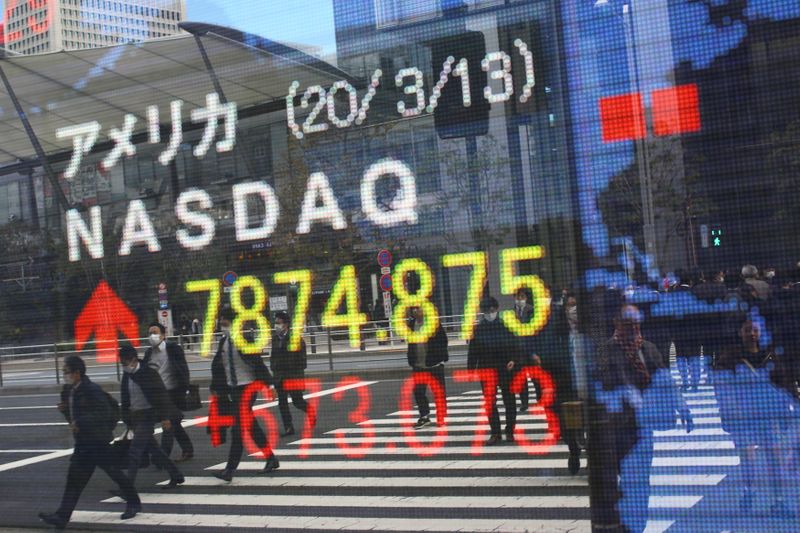By Wayne Cole
SYDNEY (Reuters) - Asian shares cleared a four-month high on Wednesday as investors remained stubbornly upbeat on the outlook for a re-opening of the global economy even as cases of the coronavirus looked to be accelerating to new peaks.
MSCI's broadest index of Asia-Pacific shares outside Japan (MIAPJ0000PUS) added 0.5% to reach its highest since pandemic lockdowns first cratered markets in early March.
South Korea (KS11) led with a rise of 1.6%, while Japan's Nikkei (N225) was held flat by a firm yen. E-Mini futures for the S&P 500 (ESc1) reversed early losses to gain 0.2%, while EUROSTOXX 50 futures (STXEc1) lagged with a loss of 0.3%.
On Wall Street, the Dow (DJI) had ended Tuesday 0.5% higher, while the S&P 500 (SPX) gained 0.4% and the Nasdaq (IXIC) 0.7%.
News on the coronavirus was hardly encouraging with several U.S. states seeing record infections and the death toll in Latin America passing 100,000 on Tuesday, according to a Reuters tally.
The European Union is even prepared to bar U.S. travellers because of the surge of cases in the country, putting it in the same category as Brazil and Russia, the New York Times reported.
Yet the market assumes there is a very high bar to shutting down economies again, so the impact on business activity will not be too great.
The dogged optimism about the global economy was supported by upbeat surveys of manufacturing from Europe, with France a stand-out as lockdown loosening there led to a modest return to growth.
That followed solid June readings from much of Asia, though Japan did disappoint.
"One surprise in the recent data has been the resiliency of activity data in emerging Asia even as the global economy slowed sharply and global demand remains below pre-pandemic levels," said analysts at JPMorgan (NYSE:JPM) in a note.
"This outcome largely appears to be due to the tech sector outperforming non-tech, most likely reflecting in part a temporary work-from-home boost to demand."
The better European data combined with the positive risk mood to keep the U.S. dollar under pressure. Against a basket of major currencies it slipped back to 96.578 (=USD) from a top of 97.719 at the start of the week.
The euro edged up to $1.1320 (EUR=), having been as low as $1.1167 on Monday, while the dollar eased to 106.50 yen
"The dollar and risk sentiment are likely to remain broadly negatively correlated, barring the U.S. displaying clear and enduring leadership in the global economic recovery, something hard to square with the grim U.S. news on COVID," said Ray Attrill, head of FX strategy at NAB.
The New Zealand dollar eased
In commodity markets, the decline in the dollar and endless cheap liquidity from central banks helped lift gold to its highest since October 2012. The metal was last at $1,770 an ounce
Oil futures eased from four-month highs after U.S. crude inventories rose a surprisingly large 1.7 million barrels last week, according to industry data. That compares with analysts' expectations for a 300,000-barrel build. U.S. government data will be released on Wednesday.[O/R]

Brent crude (LCOc1) futures declined 8 cents to $42.55 a barrel, while U.S. crude (CLc1) fell 20 cents to $40.17.